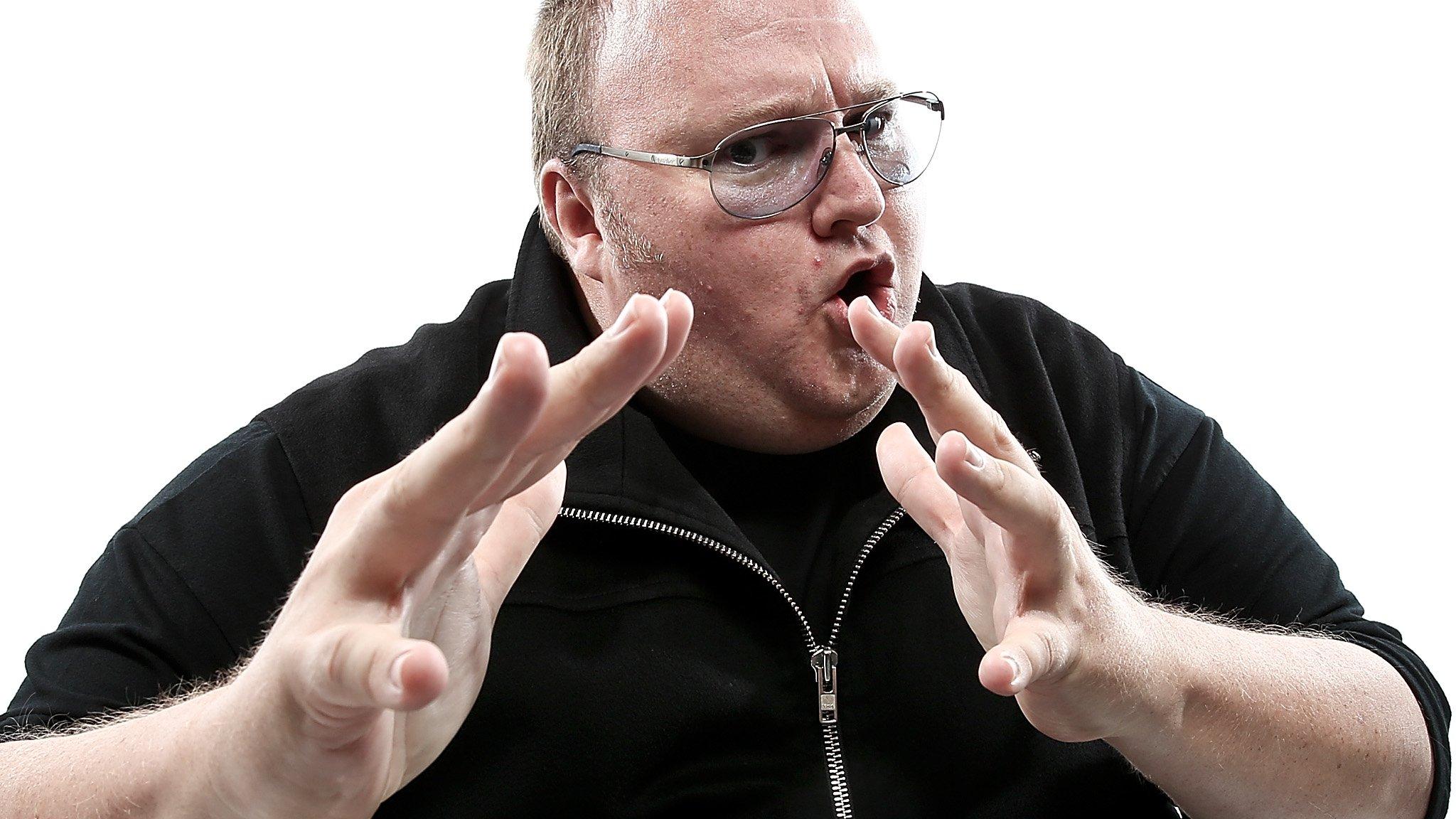Kim Dotcom: On the road with Hollywood's biggest enemy
- Published
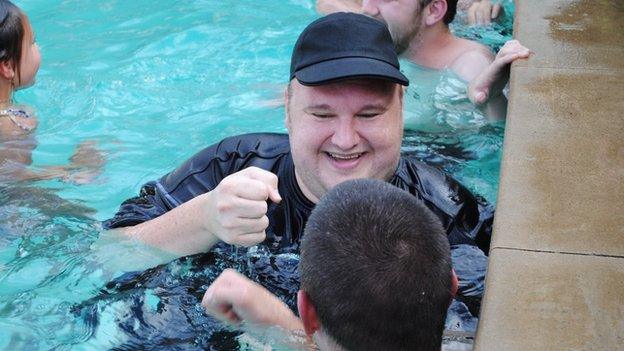
Supporters were treated to a "swim with Kim" event at the Dotcom Mansion
They thought they'd finally got him.
Kim Dotcom, the multi-millionaire hacker-turned-entrepreneur, was on the roof of his New Zealand mansion, handcuffed and surrounded.
One by one, his luxury cars were rolled out of garages and taken away. Dotcom's accounts, in various different countries, were frozen.
His website, file storage service Megaupload, was shut down.
Filings made in a court in Virginia outlined the accusation. Dotcom, US authorities said, was the man behind a "criminal enterprise" which used Megaupload to profit from piracy on a "massive scale". He faces more than 20 years in prison.
"That's when I woke up to what the United States has become," an unwaveringly defiant Dotcom tells me, with typical brashness.
"How they lie at every corner if they want to get something done. How the law doesn't even matter.
"I became a victim of that, and I said to myself, 'This is the world we're living in, and someone needs to stand up and needs to fight that.'"
And fight it he has.
As multi-millionaire Kim Dotcom launches a political party, the BBC's Dave Lee follows him on the campaign trail.
He is going head-to-head with some of the most powerful executives in Hollywood. They hold him responsible for millions upon millions of dollars in lost revenue - dollars which they say paid for a dazzling mansion situated in beautiful rolling hills near Auckland.
'Happy bubble'
Which is where I first meet him, more than two years after the raid, on a sunny Friday afternoon. He's just finished lunch.
Dotcom is sitting alone, at the head of a long, wooden table, next to a snooker table that doesn't look like it has enjoyed much use. To his right is a swimming pool that certainly has.
One thing is immediately apparent about this scene: Dotcom's quite clearly not in jail.
Since the raid, Dotcom has been mounting a stunning legal and professional comeback. Thanks to a series of delays - and in some instances, crumbling evidence - he is yet to be extradited to the US to face the charges. His next hearing is in July.
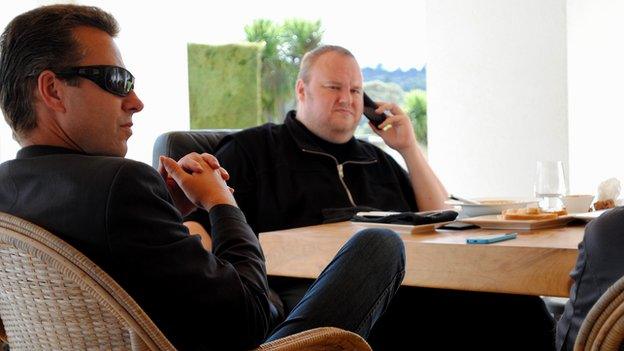
Dotcom is fighting extradition to the US - his next hearing is in July
He has won back his cars, and some of his money. He's started a new company - Mega - which serves largely the same purpose as Megaupload but with tweaked terms and conditions, and better encryption. It's already worth over a hundred million dollars.
More recently, Dotcom made his most unexpected move. He's launching his own political party, with internet-focused policies at its core.
"The Internet Party was born out of that injustice," he tells me.
"I was pulled out of my happy bubble, and my life of creation and innovation. It woke me up to a whole new reality.
"We are about social fairness, we're about freedoms and human rights. We want governments to respect human rights, especially privacy rights. I think it's going to have a broad appeal, internationally."
Days later, in a speech to some supporters, he'd put his party's mission another way: "The internet is under attack, and we have to save it."
Questionable motives
Kim Schmitz was born in western Germany in 1974. He wouldn't become Kim Dotcom until 2005.
During his teenage years, he was caught illegally hacking - but made a deal to work "for the good guys" in computer security. A later conviction for insider trading caused him to leave the country altogether.
After a brief time in Thailand, Dotcom set up shop in Hong Kong, where he founded Megaupload. Prosecutors say it was with this site that he committed crimes - knowingly allowing, even encouraging, users to upload and share copyrighted content.
Dotcom's defence is that he shouldn't be held responsible for what users uploaded, and that they removed illegal content when made aware of it.
The removal process was too difficult, say the content creators. Dotcom says it was easy. And so it goes, back and forth, lawyer to lawyer.
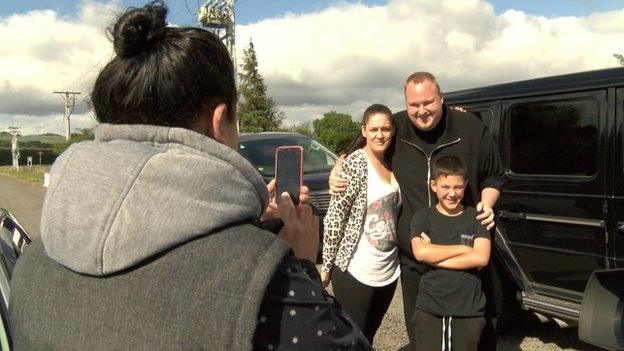
Since the raid, public support for Dotcom has grown - he is a celebrity
His past has gained him a reputation as a country-hopper evading the law. Which is how many Kiwis received him when he was granted residency in 2010: a rich foreigner, using New Zealand as a safe haven.
But the raid changed all that.
Dotcom was suddenly seen as a man standing up against the government - but more crucially, against the US. Lots of New Zealanders were uncomfortable with the level of influence the US authorities seemingly had over their own government.
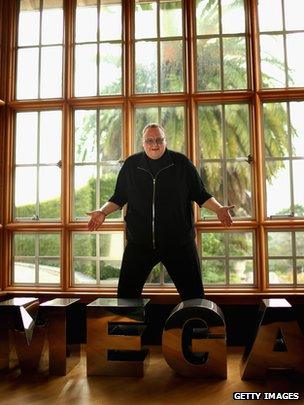
The mansion is full of references to Dotcom's file-sharing business
But still, many question Dotcom's motives in New Zealand. Several policies - particularly copyright law reform - seem to certainly be in his business and legal interests. He disagrees.
"There's no personal interest behind it," he says.
"Changing copyright law primarily will solve the problems that the content industry is creating around piracy."
Among his ideas, one proposed law stands out. If a movie studio releases an English-language film elsewhere in the world, it must be released in New Zealand at the same time.
"If you don't, and someone can find a pirated version online, well then don't blame that person for downloading it. It's your fault."
Gawpers
Dotcom's ambitions of power aren't far-fetched.
As a foreigner, he can't run for office himself. But he can choose someone to stand for him. He wants to hold public auditions - a political New Zealand's Got Talent, as it were.
New Zealand's political system means that minority parties, even new ones, can find themselves with some power by courting the "favourite party" vote - an additional tick voters can place in addition to voting for an individual candidate.
This system plays nicely into the hands of single-issue groups like Dotcom's - particularly if they team up with others.
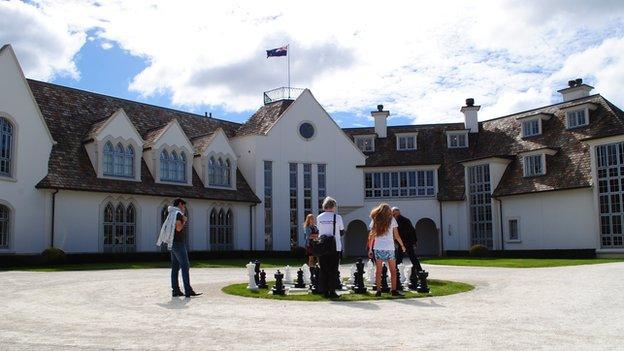
Around 500 people took up Dotcom's offer to visit the home
Which is why on my second day with the team, I find myself travelling by convoy to the stunning town of Rotorua.
We were off to meet the Mana Party, a breakaway group from the larger Maori Party.
Dotcom is behind the wheel of his beloved Mercedes 4x4 - number plate: "KIM.COM". People honk and wave as we drive past. Whenever we stop, people get out of the cars to say hello.
I can't tell if they are supporters, or just gawpers fascinated at a celebrity they've seen on TV.
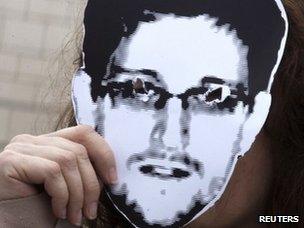
Dotcom says Edward Snowden is his "personal hero"
"There have been a lot of stories around my persona here in New Zealand over the last two years," he says. "And people are just intrigued."
"But if all of this intrigue gets me to get them here, and listen to what we're all about, and to get through to them with these ideas... I win."
On the inviting country roads, he sticks agonisingly to the speed limit. Being caught speeding would be a breach of his bail conditions. Even by Dotcom's standards, ending the day behind bars isn't an ideal day's campaigning.
Meeting the Maori
Dotcom wants to convince the Mana members to agree to a merger, giving the parties a really strong chance of winning a couple of seats in September's election.
We arrive in Rotorua to a media circus - a scene which isn't lost on the Mana Party's leader, Hone Harawira.
"I am quite sure, that at this moment, all of the media in this country are in this room," he jokes. "To hear what it is that I have to say."
With his speech, Dotcom wins them over - the Mana Party voted to open talks to a merger.
I can't understand it. What possible common ground could be found between Maori, who are among the poorest people in New Zealand, and a German multimillionaire harping on about broadband speeds?
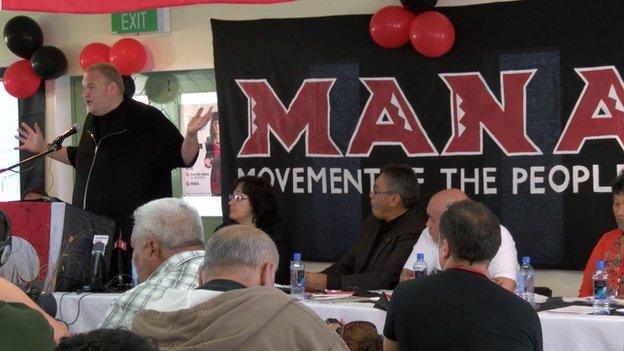
Dotcom was successful in wooing members of the Mana Party
I ask Taiaha Hawke, a Maori protocol expert drafted in to make sure Dotcom doesn't accidentally offend anyone.
"The way we see it," he says, "Anyone who sticks it to 'The Man' like he does is fine by us."
Dotcom's millions will certainly make a useful addition to the Mana Party's campaign funds, too.
We head back, via KFC, to Dotcom's mansion to see how the day plays out in the evening news bulletins - particularly as a certain well-known British couple are in town.
"Yes!" shouts Dotcom. "We beat the Royals! Awesome!"
'He is a hero'
Polls show that Dotcom's support is growing. He says a lot of his support is thanks to one man - Edward Snowden - and the revelations that shocked the world.
"To me personally he is a hero... his sacrifice will be remembered as one of the most heroic things of our time.
"Single-handedly, he has opened the eyes of the world to an injustice. Because we know about it, we can do something about it."
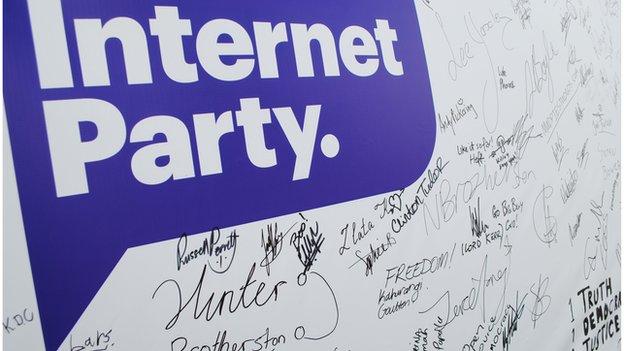
The Internet Party hopes to make a serious play for power in future elections
I point out that if his political aspirations are as successful as he envisions, Dotcom could be in a position to push for Snowden to be given asylum in New Zealand.
"I think that is too far away."
But has he ever spoken to him?
"Mm… yes."
What about?
"I don't want to go into that."
Policies in the pool
The next morning, Dotcom invites all of the Internet Party's members to the mansion for a picnic, and the promise of a "swim with Kim".
Situated about an hour outside Auckland, the mansion is hard to miss. The main house is a the bottom of a large hill, and from afar, it looks a little like a tacky medieval-themed hotel.
On closer inspection, it's more like a teenager's bed room run riot. Huge televisions at every turn, and a games room decorated with a mural depicting Dotcom and his wife Mona as video game characters.
The logo for Mega can be found all over the property. Cut into the lawn, for example, or placed in the centre of the many stained-glassed windows.
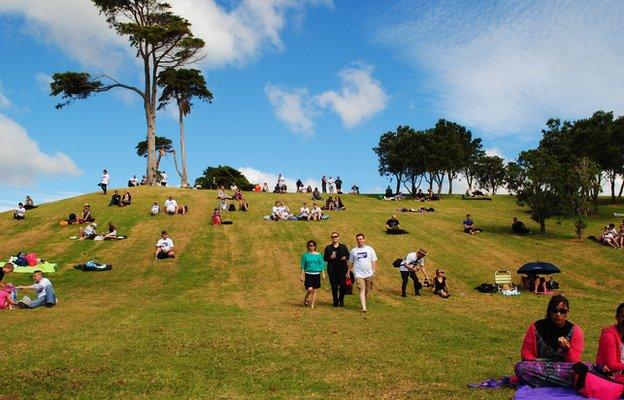
Dotcom's legal worries were not on the agenda at the Internet Party picnic
Depending on your point of view, it's either a vulgar display of flashiness, or Dotcom's way of constantly reminding himself how he earned enough money to find himself living here.
Around 500 people turn up to the party. A member of Dotcom's team urges him to be in as many selfies as possible to drive engagement on social media. He duly obliges.
In the pool, Dotcom holds court as members chuck policy ideas at him, including the suggestion he should try the name "Kim Dot-org" for a while.
No-one mentions the prospect of Dotcom being sent to jail. At least, not while he's listening.
'Epic battle'
He describes his situation as David vs. Goliath, Godzilla and the dinosaurs.
At six foot seven, Dotcom is an unlikely David.
But the pressure keeps coming. Just days before I arrived in New Zealand, both the movie and music industry launched fresh legal action, this time civil action to claim compensation for lost revenue.
He claims it's evidence that the criminal case is failing.
"Here's the thing. I have the facts on my side. I have the truth on my side.
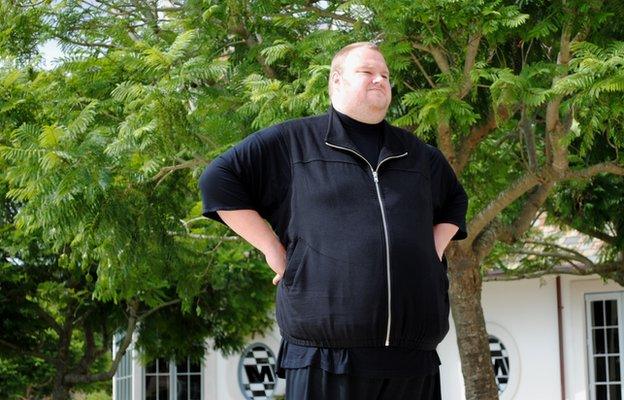
Dotcom says his legal case is like David vs Goliath, Godzilla and the dinosaurs
"I will prevail because I am not the criminal that they are trying to make out of me.
"I'm sleeping really well at night," he adds, talking less to me, and more to himself.
"They can throw another dozen lawsuits at me - it will make no difference. In the end, I'm going to prevail.
"I'm happy. I'm fine."
It's the most revealing moment of my time with him.
In this beautiful house, and surrounded by a family of young children and his wife, Mona, I think the prospect of jail worries Dotcom more than he lets on.
"I've embraced this fight now and I will see it through all the way. It's going to be an epic battle."
And it's there we part ways. Dotcom has a meeting to get to.
"Lawyers," he sighs.
"I'm always meeting with lawyers."
Follow Dave Lee on Twitter @DaveLeeBBC, external
- Published17 April 2014
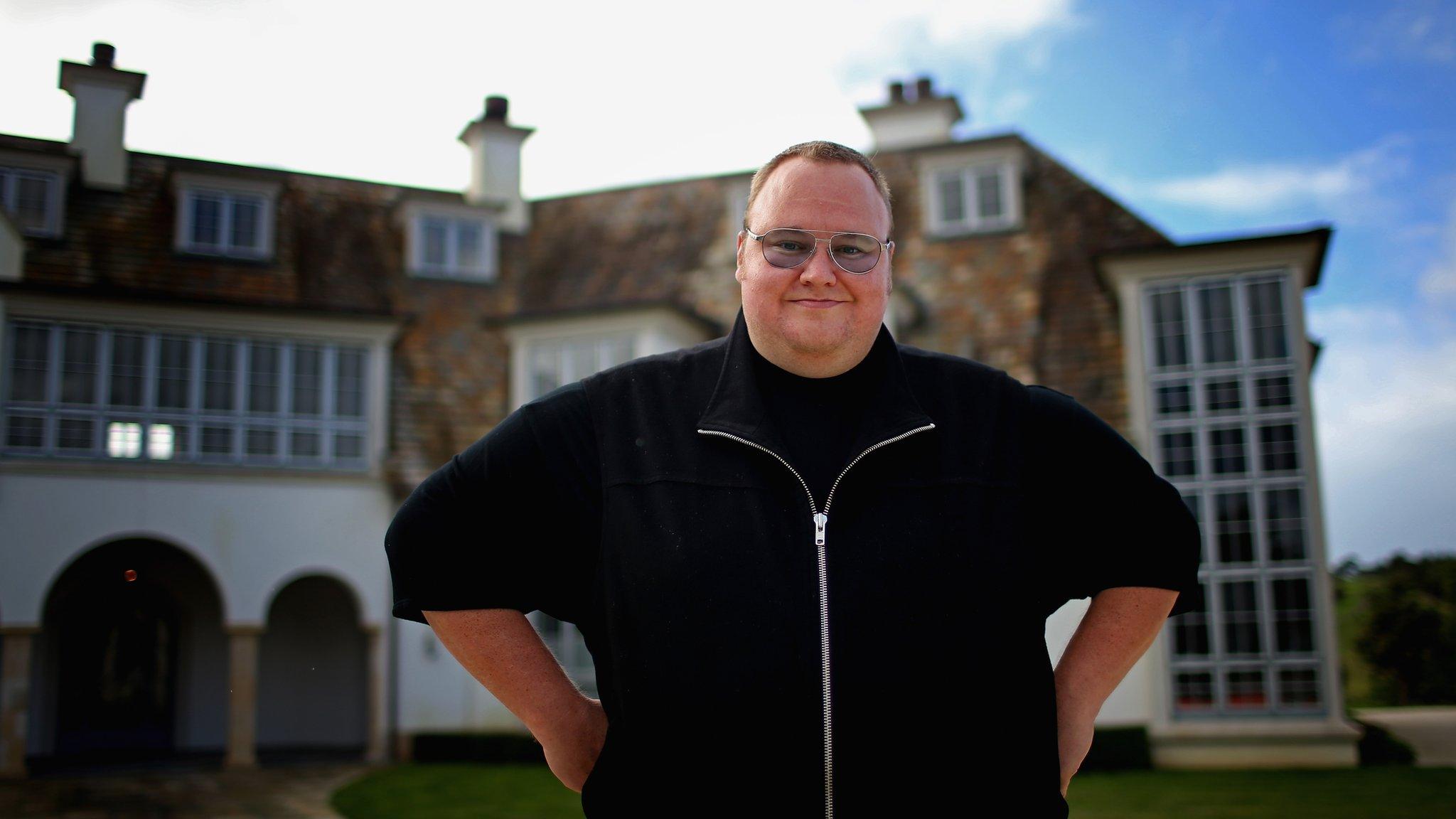
- Published8 April 2014
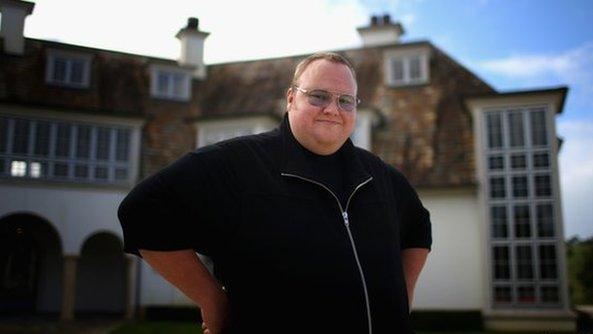
- Published27 March 2014
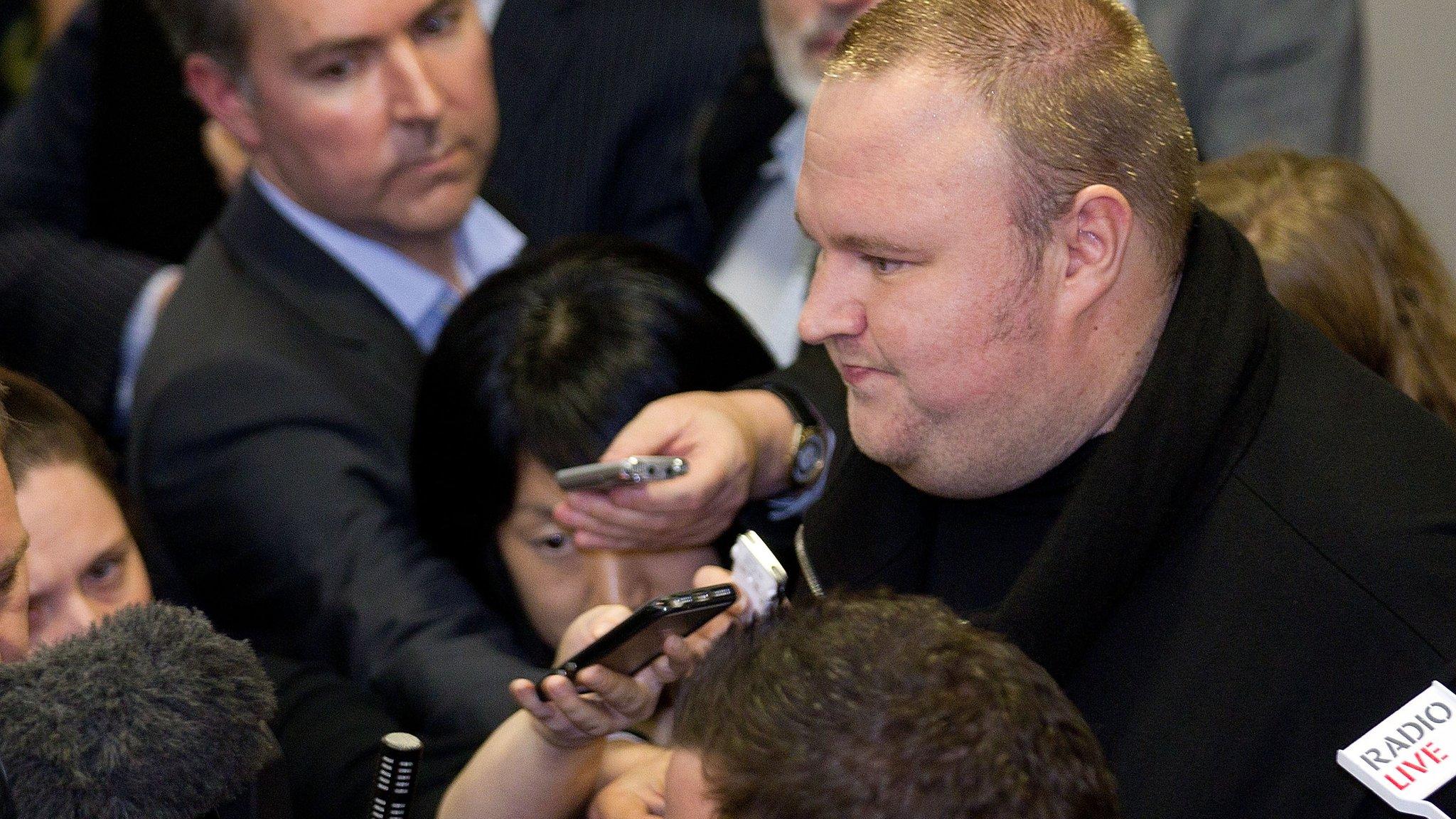
- Published25 March 2014

- Published19 February 2014
